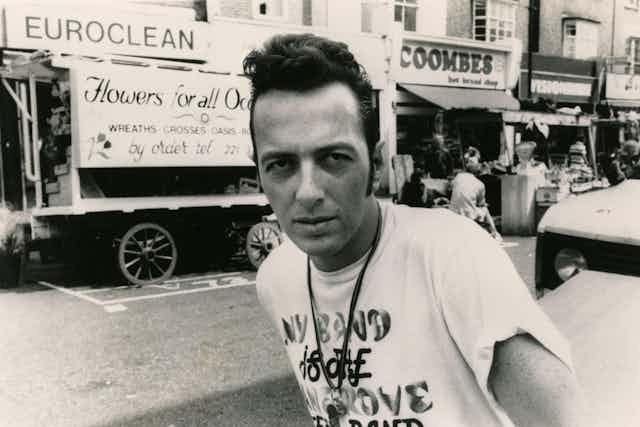Joe Strummer, lead singer and lyricist for the seminal punk band, The Clash, died 20 years ago this December. Strummer, the son of a British senior civil servant and whose real name was John Graham Mellor, wrote songs that did not shy away from the politics of the Thatcher era or situations affecting society around the world.
The Clash had six studio albums, which featured 16 top-40 hits, including Rock the Casbah and I Fought the Law. After his death, the Guardian noted that Strummer was a “political inspiration for a generation” and “the political conscience of punk”.
I spoke to more than 100 individuals of different ages and genders from different generations, countries and continents for my book: The punk rock politics of Joe Strummer: Radicalism, resistance and rebellion, I found that his music has had a profound impact on the politics of many, leading some to left-wing activism. Among their number are many union leaders in Britain today, including Matt Wrack of the Fire Brigades Union, who said): “Firefighters are immensely proud of our links with Joe Strummer and what he stood for politically and as a musician.”
According to many of those I spoke to, the lyrics in the music of The Clash provided them with an effective but unconventional initial education about issues in Britain and further afield such as unemployment and sub-standard housing in Britain as well as various political causes globally, such as the struggle of the Sandinista movement in Nicaragua in the 1980s.
Political lyrics
Two Strummer songs stand out in particular for those that I spoke to. The first is Spanish Bombs from the band’s third album, London Calling (1979), which was primarily about the Spanish Civil War of 1936-1939, Strummer sings:
The freedom fighters died upon the hill
They sang the red flag
They wore the black one…
The hillsides ring with “Free the people”
As a song about the democratically elected Republican government’s struggle against Francisco Franco’s fascist military coup, it recounts how socialists, communists, republicans and anarchists fought together for freedom, liberty and equality. Spanish Bombs led many who gave me testimonials to read the likes of George Orwell’s Homage to Catalonia.
The song also provided a historical example of active resistance to fascism when a hard right nationalism was on the rise in Britain in the late 1970s. The fringe National Front political party ran on an extreme anti-immigrant platform in the 1970s, using racist slogans and pamphlets to attract members. This was in turn met with an increasingly vocal reaction from musicians like Strummer and the Rock Against Racism movement.
An international outlook
The band’s fourth album, Sandinista!, released in 1980, embraced the cause of the Sandinista rebels against the Somoza regime in Nicaragua and attacked US attempts to underime the revolution. The Somoza family headed up a murderous and repressive dictatorship from the 1930s, which was propped up by the US and which fell in 1979 as a result of a popular armed rebellion led by the Sandinistas.
Strummer’s song Washington Bullets references the anti-democratic effects of American imperialism in central and south America, from the 1959 Cuban Revolution to the Nicaraguan Sandinistas of the 1980s, with mention of America’s aborted Bay of Pigs invasion of Cuba in 1961 and the assassination of Chile’s Salvador Allende at the hands of the Chilean military dictatorship in 1973. In it, he sings:
As every cell in Chile will tell
The cries of the tortured men
Remember Allende
The song then details what happened when the US withdrew its support from the Nicaraguan Somoza regime:
When they had a revolution in Nicaragua
There was no interference from America
The people fought the leader
And up he flew
Without any Washington bullets, what else could he do?
Strummer explains that despite repression, resistance is possible – and can be successful. His anger in the song is not just directed against Washington but also against British, Chinese and Russian imperialism. Not only did some of those I spoke to join the Nicaragua Solidarity Committee but a few also went to work as volunteers in Nicaragua to support the Sandinista revolution.
Seeking knowledge
Many of those I spoke to recounted to me that before the era of the internet, they went to public libraries to find out more about these issues. From there, they started to form radical worldviews and began to join campaigns such as the anti-apartheid movement and the Campaign for Nuclear Disarmament. Many also joined trade unions and left-wing political parties such as the Labour Party. And, with their interest piqued, they began to read widely.
Strummer was able to reach people through his music. His songs not only made people dance but through their radical messages, they were able to inspire some fans to action. Whether it be fascism and imperialism or over environmental destruction (London Calling), fighting racism (Working for the Clampdown) and Thatcherism (This is England) he moved people.
Strummer was seldom explicit about what listeners should then do – his songs tended to be more informative and inspirational than instructional. But he was nevertheless always clear that activism was positive and necessary to effect change. The Clash’s first single in 1977, White Riot, encouraged disaffected young white people to fight against political corruption and police brutality as their black brethren had. In Working for the Clampdown from the band’s 1979 album London Calling, he issued this call to arms:
Kick over the wall, cause governments to fall.
How can you refuse it?
Let fury have the hour, anger can be power.
Do you know that you can use it?

